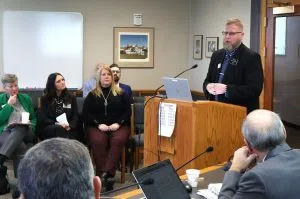 (Michael Achterling – North Dakota Monitor) – Lobbyists for the ACLU and North Dakota Apartment Association clashed over three bills that would provide North Dakota renters with more protections.
(Michael Achterling – North Dakota Monitor) – Lobbyists for the ACLU and North Dakota Apartment Association clashed over three bills that would provide North Dakota renters with more protections.
Three bills heard by the Senate Industry and Business Committee this week would provide renters protection from snowballing late fees, and empower the Department of Labor and Human Rights to investigate complaints against landlords. The department would also be able to take disciplinary action against a landlord for violations of North Dakota Century Code involving the leasing of property and eviction.
Cody Schuler, advocacy manager for ACLU of North Dakota, said 40% of renters in North Dakota are “cost burdened,” meaning those tenants tend to live paycheck-to-paycheck, spending more than 30% of their income on rent. He testified in support of all three bills.

“Individuals who are living on those margins, they live on the cusp of possibly becoming homeless,” Schuler said in an interview. “And when we look at the sheer volume of the cost of homelessness, and how to correct homelessness, it’s so much more financially responsible for everyone involved … to be able to prevent homelessness.”
Opposing all three bills, Jeremy Petron, lobbyist for the North Dakota Apartment Association, said a lot of the confusion over late fees stems from renters not reading their lease agreements, and landlords not explaining the lease and late fee processes well enough during the lease signing.
“I myself have been in the property management industry for 20 years, and the company that I work for, we communicate with our tenants and let them know … We don’t try to just automatically evict someone for just one late fee,” Petron said. “We’re going to work with them.”
All three bills were introduced by Sen. Ryan Braunberger, D-Fargo.
After the public hearing, Braunberger said he’s concerned that the committee didn’t seem receptive to his three bills.
“I think we need to make sure we’re looking at both sides,” Braunberger said. “We don’t necessarily want to punish good landlords, but we want to make sure we’re protecting good tenants too.”
Late rent payments and fees
Senate Bill 2235 would prioritize processing the payments of late rent first before late fees are processed, Braunberger said. By processing the late rent amount first, renters wouldn’t accrue as many additional late fees.
Schuler shared a story with lawmakers about a Fargo resident who lost his minimum wage job and needed rental assistance to cover a late payment and fees. The renter thought the full amount had been paid but received a three-day eviction notice after the additional late fees were processed before the late rental payment, leaving an unpaid balance.
“The fact of the matter is, he wouldn’t have even needed this assistance had this law been in place,” Schuler said.
Multiple senators on the committee questioned whether the new payment priority changes would incentivize tenants not paying any late fees.

Petron said the payment of late rent and fees is spelled out in the rental agreement, so both the renter and the landlord are on the same page.
The late fees could still be recouped by the landlord through an itemized deduction from the tenant’s security deposit after they move out, he said.
Senate Bill 2236 would cap the amount landlords can charge in late fees at 8% of the rent, Braunberger said.
“This basically will address issues regarding compounded fees,” he said. Landlords wouldn’t be able to keep adding late fees for each day or week that a payment is late unless the total fees are under 8% of the rent for the month.
Another supporter of all three bills, Kaden Felch, a fair housing specialist with the High Plains Fair Housing Center, said late fees can range from $10 to $100 with fees being added until the rent is paid in full.
“Large and accumulating late fees can set renters back for months, leading to eviction or lead to large bills that may stay with them for a long time and prevent renters from finding stable housing in the future,” Felch said. “This cap will just allow more flexibility for North Dakotans who may not have as much expendable income as others.”
Petron said the bill was essentially “price fixing” what landlords can charge for late rent payments.
“A property owner’s costs associated with operating and maintaining a property aren’t fixed and can fluctuate,” Petron said.
Investigations of complaints
Senate Bill 2237 would empower the Department of Labor and Human Rights to be able to investigate complaints against landlords and take disciplinary action against a landlord found to be in violation of state law.

Schuler said North Dakota doesn’t have a clear pathway for a state agency to address landlord-tenant disputes outside of the courtroom. During North Dakota eviction proceedings in 2022, he said landlords retained legal representation in 98% of all eviction cases and tenants were represented by attorneys in only 1% of cases, according to the Legal Services Corp.
“When we get into this place where 40% of North Dakota renters are considered cost-burdened, it’s unlikely that those individuals would have, or be able to afford, legal counsel,” Schuler said.
Zachary Greenberg, interim commissioner for the Department of Labor and Human Rights, asked lawmakers to recommend a “do not pass” on the bill due to the department’s jurisdictional, legal and administrative concerns.
He added the department doesn’t license or register landlords in the state and disciplinary actions needed to address complaints would focus on the license they don’t issue. He said other industries have their own licensing boards that can issue disciplinary actions against their membership.
“This bill grants the labor commissioner enforcement powers that do not align with existing regulatory frameworks, raising legal and procedural concerns,” Greenberg said.
He said the investigative burdens on the department would be large and require “substantial new resources.” Greenberg said the department’s estimate of about $750,000 per biennium needed to implement any sort of landlord-tenant program was very conservative.
After the hearing, Schuler said federal fair housing laws don’t address business practices, which is what the three bills are attempting to address.
No action was taken by the committee on the bills after the public hearing.









